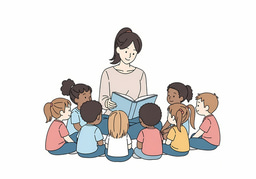Key changes to the Early Years Foundation Stage: What you need to implement now

Introduction
The start of new academic year has begun and hopefully any new children in your class are settling in well. Now that the initial hustle and bustle of meeting new children and parents has subsided and everyone is getting back into the swing of the routine, it is a great time to reflect upon policy and practice.
As many of you are aware, the 1st of September saw the introduction of the latest version of the Early Years Foundation Stage (EYFS) Framework. Key changes to the framework have come into practice following the early years safeguarding consultation in 2024. The changes predominantly focus on strengthening the safeguarding and welfare requirements. The overall aim is to improve child safety while also ensuring a supportive and secure environment for both children and practitioners. This article provides you with an overview of these key changes to refresh your knowledge and support you to implement them fully within your own practice to ensure that you remain compliant with the statutory framework.
In addition to a small number of minor changes to the structure and wording of the safeguarding requirements to make them clearer, the main key updates include:
- Whistleblowing processes
“Providers must put appropriate whistleblowing procedures in place for all staff (including students and volunteers) to raise concerns about poor or unsafe practice in the setting’s safeguarding provision” (EYFS,3.7: P23).
The EYFS framework makes it very clear that it is everyone’s responsibility to keep children safe and the latest version specifically mentions the importance of whistleblowing. All providers must ensure that they have clear and concise systems in place to enable practitioners, students and volunteers to spot and act upon any concerns. Setting policies and procedures must include how concerns can be raised through whistleblowing and outline the process of what happens after they have been raised.
- Child absence monitoring
“Providers must follow up on absences in a timely manner. If a child is absent for a prolonged period of time, or if a child is absent without notification from the parent or carer, attempts must be made to contact the child’s parents and/or carers and alternative emergency contacts” (EYFS, 3.11: P24).
All providers now must have clear child absence monitoring processes in place, which should include a specific setting policy on attendance. Your setting attendance policy should outline the expectation of parents to report their child’s absence and explain the procedures that the setting will follow if they do not report their child’s absence. This will include the standard procedure of the setting contacting the parents or emergency contacts if they have not reported their child’s absence.
Under the updated EYFS, as a setting you now also have a statutory responsibility to ensure that you have both primary and emergency/backup contacts for every child. It is important to ensure that contact information (such as phone numbers) are up to date and you should check with each child’s parents regularly to ask if there are any changes to the information which you hold.
Furthermore, as a setting you have a statutory responsibility to closely monitor children’s attendance and highlight any potential patterns or trends in their attendance and/or absences. If you have any concerns regarding a child’s attendance you can contact your local children’s social care service for advice or, if you feel a child is at immediate risk of harm, you can contact the police and request a welfare check.
- Safer recruitment:
“Providers must obtain a reference for any member of staff (including students and volunteers) before they are recruited” (EYFS, 3.20: P26).
It remains a statutory requirement that settings must have policies and procedures in place to ensure that only suitable adults are employed. However, the latest update to the EYFS now includes a mandatory requirement that all employers must gain references for all staff, students and volunteers before they are recruited. It is the responsibility of the employer to obtain the reference and should not rely on the applicant to obtain their own references.
- Safeguarding training and support
“Providers must ensure that all practitioners are trained in line with the criteria set out in Annex C. Providers must ensure that practitioners are supported and confident to implement the setting’s safeguarding policy and procedures on an ongoing basis” (EYFS, 3.30: P28).
Safeguarding training still needs to be at the forefront of your practice. Your setting should continue to offer regular safeguarding training and provide guidance on how to implement your settings policies and procedures. Furthermore, all new staff and trainees should be fully supported to understand their role and responsibilities clearly. The latest update to the EYFS has now included new guidance and criteria for what practitioners safeguarding training must include. This guidance can be found in Annex C of the EYFS framework on pages 53-54.
- Paediatric first aid
“Providers may count students and long-term volunteers (aged 17 or over) and apprentices (aged 16 or over) in ratios at the level below their level of study, but only if the provider is satisfied they are suitable (as in paragraphs 3.13 to 3.16) competent and responsible, and they hold a valid and current paediatric first aid qualification” (EYFS, 3.56: P:35).
It is a new statutory requirement that all early years students and trainees must hold a valid and current paediatric first aid qualification to be included in ratio. Furthermore, under new statutory requirements, a practitioner who is paediatric first aid trained needs to be present during snack and meal times (see below for further information).
- Safer eating practices
“Whilst children are eating there should always be a member of staff in the room with a valid paediatric first aid certificate” (EYFS, 3.24:P:36).
To ensure good practice around eating and drinking, all children must be supervised during meals/snacks to reduce choking risk, which includes ensuring that children are facing adults. Most choking happens silently, so it is important that you can clearly see a child to quickly identify and respond to choking incidents.
All practitioners should be aware of any allergies, intolerances and special dietary requirements a child has and have clear procedures in place to ensure children are kept safe while eating. This is particularly important for some children with SEND as they may have specific care plans in place surrounding eating and drinking. Therefore, you should always check and follow any health and care plans set by any professionals working with a child to ensure that they are supported and kept safe.
- Toileting and privacy
“Providers must ensure…Children’s privacy is considered and balanced with safeguarding and support needs when changing nappies and toileting” (EYFS, 3.86: P40).
Although there are not any new requirements set out within the framework, a stronger emphasis has been placed on ensuring that practitioners are respecting children’s privacy and dignity, while also adhering to safeguarding practices during toileting and nappy changing. All settings should also ensure that there are suitable hygienic changing facilities for meeting the personal care needs of any children who are in nappies.
Summary
It is your responsibility as early years providers to ensure that you are implementing the current version of the EYFS framework. This includes ensuring that all setting policies and procedures are updated to reflect the most recent changes. All practitioners, students and volunteers should be made aware of the updates and how it influences practice to ensure everyone is working together to keep all children healthy and safe. It is also good practice to share the most recent updates and changes you make within your policies and procedures with parents. You can find links to the current EYFS frameworks below:
Early years foundation stage statutory framework for childminders
EYFS statutory framework for group and school-based providers





Please sign in or register for FREE
If you are a registered user on SEND Network, please sign in